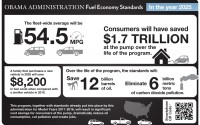Rebuttal: The CAFE Standards Are Not Good For America
 Recent NAFA publication articles addressing the topic of U.S. CAFE standards have drawn the attention of several NAFA Members who feel the optimistic appraisal is, at best, overly rosy and, at worst, untenable and bad for business. They have, in turn, asked that another viewpoint be presented and have directed attention to the following examples.
Recent NAFA publication articles addressing the topic of U.S. CAFE standards have drawn the attention of several NAFA Members who feel the optimistic appraisal is, at best, overly rosy and, at worst, untenable and bad for business. They have, in turn, asked that another viewpoint be presented and have directed attention to the following examples.
These new fuel economy standards, announced by the Obama administration in October, require automakers to achieve a fleet fuel economy average of 54.5 miles per gallon (MPG) and emit 163 grams of carbon dioxide per mile by 2025.
A piece written by Conservative commentator Charli Coon, published originally in 2001 on the American Heritage website, has been widely circulated as a rebuttal against the claims presented by the proponents of the increased CAFE standards. From the piece, Coon stated, "The CAFE program has failed to achieve its goals. Since its inception, both oil imports and vehicle miles driven have increased while the standards have led to reduced consumer choice and lives lost that could have survived car crashes in heavier vehicles.
Coon continued, "The CAFE standards should not be increased. They should be repealed and replaced with free market strategies. Consumers respond to market signals. As past experience shows, competition can lead to a market that makes gas guzzlers less attractive than safer and more fuel-efficient vehicles. That is the right way to foster energy conservation."
Among Coon’s arguments against the standards is a primary tenet for its supporters; environmental impact. "Federal regulations impose emissions standards for cars and light trucks, respectively. These standards are identical for every car or light truck in those two classes regardless of their fuel economy," Coon wrote. "These limits are stated in grams per mile of acceptable pollution, not in grams per gallon of fuel burned. Accordingly, a Lincoln Town Car with a V-8 engine may not by law emit more emissions in a mile, or 10 miles, or 1,000 miles, than a Chevrolet Metro with a three-cylinder engine.
"As noted by the National Research Council (NRC) in a 1992 report on automobile fuel economy, "Fuel economy improvements will not directly affect vehicle emissions." In fact, the NRC found that higher fuel economy standards could actually have a negative effect on the environment:
- Improvements in vehicle fuel economy will have indirect environmental impacts. For example, replacing the cast iron and steel components of vehicles with lighter weight materials (e.g., aluminum, plastics, or composites) may reduce fuel consumption but would generate a different set of environmental impacts, as well as result in different kinds of indirect energy consumption.
"Nor will increasing CAFE standards halt the alleged problem of "global warming." Cars and light trucks subject to fuel economy standards make up only 1.5 percent of all global man-made greenhouse gas emissions."
Other commentary on the subject includes an article titled Auto CAFE Standards: Unsafe and Unwise at Any Level, attributed to William Laffer III and presented in some of the earliest CAFE standards wrangling from 1991, suggested, "While conservation of fuel is valued by proponents of higher CAFE standards, they usually ignore what is more important: human life. The evidence now is overwhelming that CAFE kills. The reason is simple. The easiest way to increase a vehicle's fuel efficiency and, beyond a certain point, the only way is to reduce the vehicle's weight by reducing its size and its steel content. While technological improvements in engines or body design also contribute to increased fuel efficiency, there are limits to what technology alone can do. In fact, other federal regulations often limit such improvements. Controls on auto emissions, for example, have forced changes in engine and exhaust system design that reduce gas mileage."
What is your opinion of the U.S. CAFE standards? Start the conversation on out LinkedIn page by clicking here.
To read these articles in full, visit: Auto CAFE Standards: Unsafe and Unwise at Any Level and Why the Government's CAFE Standards for Fuel Efficiency Should Be Repealed, Not Increased
 Recent NAFA publication articles addressing the topic of U.S. CAFE standards have drawn the attention of several NAFA Members who feel the optimistic appraisal is, at best, overly rosy and, at worst, untenable and bad for business. They have, in turn, asked that another viewpoint be presented and have directed attention to the following examples.
Recent NAFA publication articles addressing the topic of U.S. CAFE standards have drawn the attention of several NAFA Members who feel the optimistic appraisal is, at best, overly rosy and, at worst, untenable and bad for business. They have, in turn, asked that another viewpoint be presented and have directed attention to the following examples.